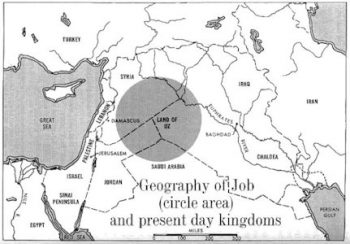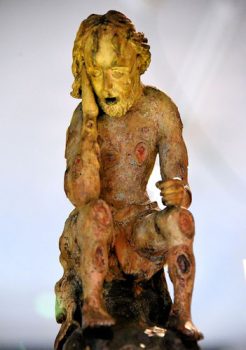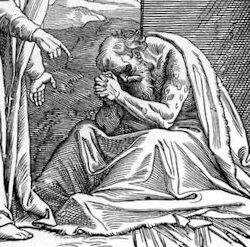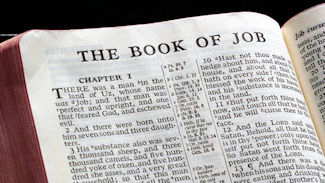This article is not a discourse on the whole book of Job in the Bible, but only concerns the second half of chapter 4, where one of Job’s friends explains a dream he once had. The friend believes it is divine wisdom from God, and we will examine the dream to see if that is true.
Most visitors to this website are probably familiar with the Old Testament story, but for those who are not, here is an overview of the first four chapters, along with some supplementary information, which will help in understanding the time, place, and situation. If possible, you should actually read chapters 1 through 4.
The Book of Job, tucked between Esther and Psalms in most Bibles (but not all), is a story to teach us about God’s justice concerning humanity’s suffering. It’s unknown author does this by reshaping an already existing story concerning the trials and tribulations of a righteous man.1 The story, written in a poetic form, flows through a variety of perspectives and you can tell it was rewritten as an allegory, because it begins in the same language style many parables do: “There was once a man in the land of Uz whose name was Job” (Job 1:1, NRSV [some translations vary]).2
The Book of Job was written before the Mosaic Law, because his daughters were heirs of his estate along with their brothers (Job 42:15) and this would not have been possible under the Law if a daughter’s brothers were still living (Numbers 27:8). Also, he lived 140 years after his calamities ended (Job 42:16) and that corresponds with the life spans of the founding fathers of the Hebrew people. So, we can assume that he lived sometime during that of the Patriarchs.3
 The land of Uz was probably situated in an area where the modern day borders of Syria, Jordan, Saudi Arabia, and Iraq join.4 It was a fertile area where good hard-working people could prosper. One such person was this man named Job who is described as a righteous man and blessed with a large family, great wealth, and many servants.
The land of Uz was probably situated in an area where the modern day borders of Syria, Jordan, Saudi Arabia, and Iraq join.4 It was a fertile area where good hard-working people could prosper. One such person was this man named Job who is described as a righteous man and blessed with a large family, great wealth, and many servants.
The first two chapters of Job contrast two scenes, the first is on Earth and the second in Heaven. On Earth we learn about Job and his righteous life, while in Heaven we learn about a discussion concerning Job between God and Satan.
After God points out to Satan how good Job is by saying, “Have you considered my servant Job? There is no one like him on the earth, a blameless and upright man who fears God and turns away from evil” (Job 1:8), Satan replies that Job’s strong moral principles, religious devotion, and reverence are only manifest because God has continually blessed him. Take it all away and he will curse you, Satan suggests. “The LORD said to Satan, ‘Very well, all that he has is in your power; only do not stretch out your hand against him!’ So Satan went out from the presence of the LORD” (Job 1:12) and then, through a series of various events, took everything away from Job, his home, his animals, his servants, and his children.
Job tears his robe and shaves his head, both customary acts of mourning.5 Even after all that Satan did, Job still had a firm grip on his integrity. So, in another meeting with God, Satan suggests that if Job lost his health, he would surely then curse God. “The LORD said to Satan, ‘Very well, he is in your power; only spare his life. So Satan went out from the presence of the LORD, and inflicted loathsome sores on Job from the sole of his foot to the crown of his head’” (Job 2:6-7). It became so bad for Job that his wife told him, “Do you still persist in your integrity? Curse God, and die” (Job 2:9). But Job’s reply was, “‘Shall we receive the good at the hand of God, and not receive the bad?’ In all this Job did not sin with his lips” (Job 2:10).
 We aren’t told what this illness was, but “the same Hebrew word is used to describe one of the plagues (Exodus 9:9–11), Hezekiah’s illness (2 Kings 20:7), and a disease associated with the curses of Deuteronomy (Deuteronomy 28:27). Subsequent references in Job give us the following symptoms of this disease: inflamed eruptions (Job 2:7); intolerable itching (2:8); disfigurement (2:12); maggots in the ulcers (7:5); terrifying dreams (7:14); running tears (16:16); fetid breath (19:17); emaciation (19:20); erosion of the bones (30:17); blackening and peeling of the skin (30:30).”6 We are told that Job sat in ashes (Job 2:8) which some primitive cultures used to sooth their sores.7
We aren’t told what this illness was, but “the same Hebrew word is used to describe one of the plagues (Exodus 9:9–11), Hezekiah’s illness (2 Kings 20:7), and a disease associated with the curses of Deuteronomy (Deuteronomy 28:27). Subsequent references in Job give us the following symptoms of this disease: inflamed eruptions (Job 2:7); intolerable itching (2:8); disfigurement (2:12); maggots in the ulcers (7:5); terrifying dreams (7:14); running tears (16:16); fetid breath (19:17); emaciation (19:20); erosion of the bones (30:17); blackening and peeling of the skin (30:30).”6 We are told that Job sat in ashes (Job 2:8) which some primitive cultures used to sooth their sores.7
Three of Job’s friends, Eliphaz, Bildad, and Zophar, hear about his misfortune and came from afar to visit. For a whole week after arriving they said nothing, but sat silently with him, because they saw how great his suffering was. It was a custom, at that time, that the afflicted or grieving person should be allowed to speak first.8
Finally in chapter 3, Job starts to speak and his complaint questions the wisdom of God in allowing him to be born, but he does not curse God. He wonders why life was given to someone whose lot in life is to suffer.9 As biblical scholar David Dockery wrote, “The day of birth is to the individual what creation is to the whole world. Job cursed the day of his birth and, in doing so, reversed the language of Genesis 1. He called for darkness to overwhelm the day in contrast to the ‘Let there be light’ of Genesis 1:3. He called for the stars and sun to be blotted out (Job 3:9; contrast Genesis 1:14–19). Job even invoked the name of Leviathan, a monster symbolic of destruction and chaos (Job 3:8). Job desired creation to revert to chaos (Genesis 1:2). For him the order and structure of the universe had already been turned upside down, and life no longer made sense.”10
Chapter 4 and the Vision
Now we are at chapter 4, the main part of our study, when the first of Job’s friends speaks. Eliphaz, most likely the oldest, is identified as a Temanite—meaning from Teman in Edom. His speech is of a simple theological tradition with a tone of moral superiority.11
Although starting off politely and almost apologetically, he soon begins to “add salt to Job’s wounds” by pointing a finger of accusation. “His one thought is that the righteous cannot perish; the wicked alone suffer, and in measure as they have sinned (Job 4:7–9).”12 In other words, Job must have sinned against God to be in his present position. Eliphaz continues by using a farming analogy about reaping what you sow; those who cause evil and trouble to others would experience trouble themselves and a blast of God’s anger could blow them away.13
 To add credibility to what he was stating, Eliphaz relates about once having a vision—one he believed came from God. For Eliphaz, this special personal revelation given to him in a vision determined how Job should respond to his problems. Basically, the vision demonstrated that suffering is sent by God to punish, so everyone has trouble, because everyone sins. Therefore, he implies, Job suffers because Job has sinned.14 However that is not truly the case because, in the New Testament, Jesus even specifically mentions that those who suffer and perish are not necessarily more guilty than those who escape (Luke 13:1-5).15
To add credibility to what he was stating, Eliphaz relates about once having a vision—one he believed came from God. For Eliphaz, this special personal revelation given to him in a vision determined how Job should respond to his problems. Basically, the vision demonstrated that suffering is sent by God to punish, so everyone has trouble, because everyone sins. Therefore, he implies, Job suffers because Job has sinned.14 However that is not truly the case because, in the New Testament, Jesus even specifically mentions that those who suffer and perish are not necessarily more guilty than those who escape (Luke 13:1-5).15
However, even though Eliphaz attempts to add authority to his theological viewpoint brought to him by the dream, his understanding of God is limited, at best. And of course, the fact is that the LORD himself said Job respects God, that he was blameless, and he turned away from evil (Job 1:8), but Eliphaz did not know about this discussion in heaven. So, we must make a case against Eliphaz’s errors using his own words.
First, Eliphaz said of his vision, the spirit had come secretly: “Now a word came stealing to me, my ear received the whisper of it,” (Job 4:12). This is an appeal to Job’s desire for special revelation, and reminiscent of what the serpent did with Eve. Notice it says “a word came” but does not say “a word of God came,” which is the usual way it would be stated in the Bible if it was from God. Second, the spirit came at night in an intimidating hair-raising nightmare: “Amid thoughts from visions of the night, when deep sleep falls on mortals, dread came upon me, and trembling,” (Job 4:13-14). God’s spirit is one of love, not of fear. An announcement of “fear not” is common among angelic-human encounters, but was plainly missing from this one. Then he said, “I could not discern its appearance,” (Job 4:16), which is odd, since we do not normally find obscurity in angelic appearances.16
This spiritual being further tells Eliphaz that God can trust neither his angels, nor humankind, “Even in his servants he puts no trust, and his angels he charges with error; how much more those who live in houses of clay” (Job 4:18-19). This “would place man beneath the level of moral judgment, as a mere earth-creature whose life and death are of no account even to God.”17 But the fact is God does trust his servants and, certainly, humans. Throughout history, God has entrusted people to deliver his messages: Moses, Elijah, the prophets, the Apostles, and others. God, in fact, wants people to be his messengers and has entrusted the content of the gospel to humankind, (1 Thessalonians 2:4).18
Conclusion
Eliphaz may understand some truths, but his assumptions and conclusions in this case are wrong, so did Eliphaz receive his vision from a spirit or angel of God? No, it appears that, once again, the evil of Satan is disguised as an angel of light (2 Corinthians 11:14). “Who else but the devil would point out that his angels he charges with error. Eliphaz was a false prophet.”19 The Bible refutes all the assertions that this spirit makes. Eliphaz was being used to impart false information to influence Job in his time of affliction. Satan was using Eliphaz to deceive and trick Job into cursing God.
 “The patience of Job was the patience of a man who endured up to the very end. No break down occurred; at every stage he triumphed, and to the utmost point he was victorious.”20 This lesson in Job 4 is important because it illustrates the value of testing a spirit by what it says. If it doesn’t follow what is taught in the Bible, it isn’t from God. In 1 John 4 we are given good advice on testing the spirits.
“The patience of Job was the patience of a man who endured up to the very end. No break down occurred; at every stage he triumphed, and to the utmost point he was victorious.”20 This lesson in Job 4 is important because it illustrates the value of testing a spirit by what it says. If it doesn’t follow what is taught in the Bible, it isn’t from God. In 1 John 4 we are given good advice on testing the spirits.
“Beloved, do not believe every spirit, but test the spirits to see whether they are from God; for many false prophets have gone out into the world. By this you know the Spirit of God: every spirit that confesses that Jesus Christ has come in the flesh is from God, and every spirit that does not confess Jesus, is not from God.” (1 John 1:1-3)
There is much more to the story of Job, so read it all. His other friends speak and present arguments and even God speaks his own mind. And finally, there is a happy ending—Job’s fortunes are more than restored.
This book is all about why people suffer, especially godly people. The moral is to have patience, endurance, and faith and put your trust in God. The summary I get from the whole Book of Job is that, just like within its story, God is allowing Satan to rule our present world for a time. He is letting Satan try to manipulate his earthly children with false doctrine to see if they will keep their integrity. Like with Job, a full restitution of things is possible. As told in the creation story in Genesis, God rested after six periods of work, but it does not say that he was finished. Now is the time for humankind’s education. The end of our schooling is approaching, but how many will pass the final exam?
(See ‘References & Notes’ for a song about Job.)21
![]()
Copyright © 2019, Dr. Ray Hermann
OutlawBibleStudent.org
→ Leave comments at the end, after References & Notes.
OBS respects your privacy and is compliant with the European Union GDPR regulation.
References & Notes
- Corney, Richard W., “Job,” (Virginia Theological Seminary, 2008), https://vts.myschoolapp.com/ftpimages/95/download/download_group10629_id432547.pdf
- Unless otherwise noted, all scripture quotations are from the New Revised Standard Version Bible (NRSV), ©1989 the Division of Christian Education of the National Council of the Churches of Christ in the United States of America. Used by permission. All rights reserved.
- Anderson, Kerby, “When Was the Book of Job Written?” (Probe for Answers, 27 May 2003), https://probe.org/when-was-the-book-of-job-written/
- “Land of Uz,” (Wikipedia, Wikimedia Foundation, Inc., 17 January 2019), https://en.wikipedia.org/wiki/Land_of_Uz
- Schultz, Carl, “Job,” in Evangelical Commentary on the Bible, Baker Reference Library (Grand Rapids, MI: Baker Book House, 1995), vol. 3, p. 343.
- Ibid.
- Zuck, Roy B., “Job,” in The Bible Knowledge Commentary: An Exposition of the Scriptures, (Ed.) J. F. Walvoord and R. B. Zuck, (Wheaton, IL: Victor Books, 1985), vol. 1, p. 721.
- Ibid., p. 722.
- Elwell, Walter A. and Beitzel, Barry J., “Job, Book Of,” Baker Encyclopedia of the Bible, (Grand Rapids, MI: Baker Book House, 1988), p. 1170.
- Dockery, David S., (Ed.), Holman Bible Handbook, (Nashville, TN: Holman Bible Publishers, 1992), pp. 313–314.
- Brand, Chad, et al., (Eds.), “Eliphaz,” Holman Illustrated Bible Dictionary, (Nashville, TN: Holman Bible Publishers, 2003), p. 481.
- Singer, Isidore, (Ed.), The Jewish Encyclopedia: A Descriptive Record of the History, Religion, Literature, and Customs of the Jewish People from the Earliest Times to the Present Day, 12 Volumes, (New York; London: Funk & Wagnalls, 1901–1906), p. 136.
- Horton, Stanley, and Phelps, Mark, (Eds.), The Old Testament Study Bible, Ezra, Nehemiah, Esther, Job, The Complete Biblical Library, (Springfield, MO: World Library Press Inc., 2000), p. 367.
- Ibid., p. 369.
- Schultz, Carl, “Job,” in Evangelical Commentary on the Bible, Baker Reference Library (Grand Rapids, MI: Baker Book House, 1995), vol. 3, p. 344.
- Frasue, Basil, “Discerning of Sprits,” (Vinyard Ink Press, 1994), http://www.wholeperson-counseling.org/doc/discern-s.html
- Watson, Robert A., “The Book of Job,” in The Expositor’s Bible: Samuel to Job, (Ed.) W. Robertson Nicoll, (Hartford, CT: S.S. Scranton Co., 1903), vol. 2, p. 718.
- Frasue, Basis, “Discerning of Sprits,” (see above).
- “Job 4:12-21,” (Word of the Cross, 7 May 2012), https://wordofthecross1cor1.wordpress.com/2012/05/07/job-412-21/
- Exell, Joseph S., The Biblical Illustrator: James, (Cincinnati; Chicago; Kansas City: Jennings & Graham, n.d. [about 1905]), chap.5, ver.11, p. 461.
- “Broken Praise,” artist: Todd Smith, authors: Bernie Herms & Nichole Nordeman, (from album: Music Inspired by The Story, label: EMI CMG/Word/Provident, September 2011) – VIDEO, https://youtu.be/D6PP-YS-FqU


I was once in trial but definitely not close to the level of Job’s. Some colleagues and friends wondered why I could suffer such a fate knowing my standing with the Lord. Others mocked saying it was my sins. Then some messages in my church didn’t help either just close to that of Eliphaz, full of judgemental/condemnation. But my response to myself and those who cared to talk to my face was always the case of Job and how my problem was so very minute compared to that of Job’s because God knew what my strength could bear.
The Bible says we should count it all joy when we face a fiery ordeal as though something strange is happening to us. It’s a way of sharing in Christ’s suffering and we should always remember that sufferings are common among all true Christians throughout the whole world. May God help us not to fail in our times of testing in Jesus’ name 🙏
Thanks for visiting this website and it is appreciated that you are willing to share your experience. I’m sure that others will find your testimony as encouragement to get through their own trials.
Plenty of Eliphazes exist, I would normally call them “busy bodies” and avoid them like the flu, but that is not how God wants us to view his creation and other Believers. The proper response to the “know it all Eliphaz” is to pray for him like Job did.
Also, let him without sin cast the first stone, so I do my best not to judge, which is hard for me when I feel so annoyed. I am also learning to pray for myself to have more love. My hubby’s advice to me is to not pray for patience so I pray for love. The tests to love others is far easier for me (and my hubby) than those used to grow patience, but I figure my lack of patience is a lack of love anyway, so I pray for that.
It’s not easy tolerating Eliphaz, he comes with a bucket of salt and zero understanding, neither of you or your situation, or much of anything for that matter it seems, but no one is perfect, EVERYONE sins, or we would not need Jesus Christ.
Thank you for reading this article and for taking the time to comment. You are correct, of course, and your insight is ‘spot-on’.